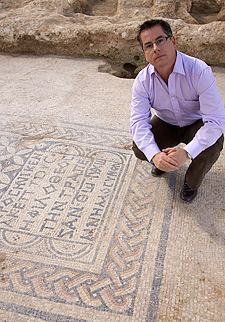
In the midst of all doctrinal turmoils that the Church worldwide is facing, particularly the 'all-inclusive-feel-good-gospel' the following review of the book "The Discipline of Spiritual Discernment" fits perfectly. From
Bill Muehlenberg's blog and
via the Anglican Mainstream's site.
There was a time when it was a virtue to be known as discerning and discriminating. That was before Political Correctness set in. Now in an age of relativism and postmodernism, a fraudulent form of tolerance has arisen. As a result, people are terrified of speaking out on anything, for fear of being accused of being intolerant, narrow-minded and dogmatic.
Sadder still, this foolish idea of tolerance has crept into the churches as well. Now many believers are actually claiming that Christians should not judge, should not rebuke, and should not claim to have the truth. Somehow we have come to believe that spiritual maturity has something to do with the suspension of judgment and the absence of critical discernment.
But Tim Challies argues that the exact opposite is the case: spiritually mature Christians are those who have learned the discipline of biblical discernment. Indeed, a lack of discernment results in spiritual immaturity, backsliding and worse.
Challies defines spiritual discernment as the “skill of understanding and applying God’s word with the purpose of separating truth from error and right from wrong”.
It is, in other words, thinking biblically about life. He argues that it is a practice, like prayer and Scripture reading, which must be developed and maintained. Without the discipline of spiritual discernment, we will be ineffective for service in the Kingdom.
Challies offers many texts to make his case. He begins with the prayer of King Solomon in which he asks God for “an understanding mind” to govern his people, and that he “may discern between good and evil”. God was pleased with his request and granted it. Even today, we still speak about the wisdom of Solomon.
Of course Jesus had to upbraid his disciples for not being understanding, or discerning (Mark 8:17-21). The New Testament writers make much of this theme. In Eph. 5:10 Paul says we should “discern what is pleasing to the Lord”.
In Heb. 5:11-14 we are told that spiritual maturity comes when believers “have their powers of discernment trained by constant practice to distinguish good form evil”. Challies reminds us that the Hebrew Christians were not new believers, and they should have known better. But they were still stuck on the milk of the Word, and not able to handle strong meat.
Sound theology, in other words, is part of what makes for mature believers. We need to study the Word and distinguish truth from error, right from wrong. But many in the church today look down on theology, denigrate doctrine, celebrate doubt and rubbish the mind. That is a recipe for disaster says Challies.
Developing biblical discernment is part of the way in which we develop a biblical worldview. Unfortunately a secular worldview is far too often prevalent in the churches. Many believers have latched onto false notions of tolerance, have downplayed doctrine, have rejected the idea of truth, and have embraced the values of the world.
When believers stop thinking Christianly, their thoughts and values do not remain in neutral: they end up absorbing the beliefs, values and practices of the surrounding secular culture. We end up believing and acting pretty much like everyone else does.
Indeed, researchers such as George Barna have documented the loss of a biblical worldview, and the resultant loss of character and biblical lifestyle. This is why spiritual discernment is so important.
Spiritual maturity, brought on by biblical discernment, will help us live lives of integrity and sound character, and will help preserve the gospel from error and deception. Both are vitally important.
Challies discusses the importance of judging, and looks at passages which seem to forbid it, such as Matt. 7:1. He rightly notes that hypocritical judgment is what Jesus warns against here. Challies examines the various passages that urge us to test all things and to discern, evaluate and assess.
He further discusses such things as the gift of discernment, the dangers of discernment, the development and practice of discernment, and the discipline of discernment. Thus this volume is a practical and level-headed look at a much needed spiritual resource.
We have plenty of books on the discipline of prayer, bible reading, fasting, and so on. But the area of Christian worldview and biblical discernment is not usually associated with such topics. But these disciplines all go together, resulting in spiritual growth and maturity.
Challies is to be praised for drawing to our attention the pressing need for spiritual discernment, and how it may be achieved.
Labels: Apologetics, Bible, Christianity, Church, Jesus, Orthodox Faith, Radical Christianity



